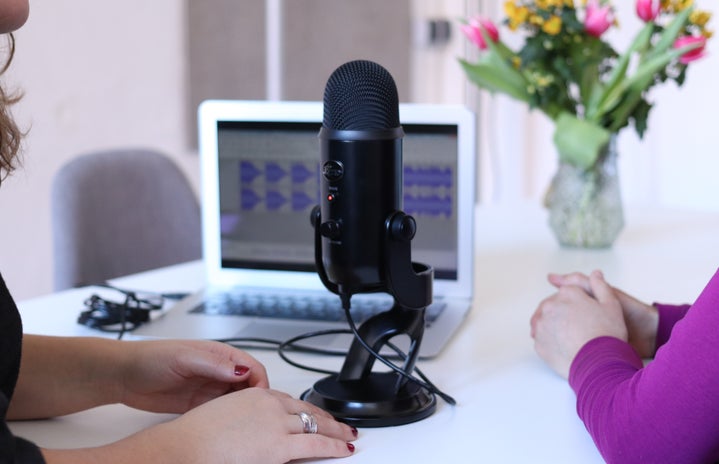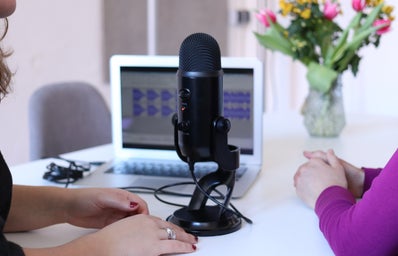In the media age, where social media and the internet is so saturated with massive amounts of information at unprecedented levels, younger audiences are especially drawn to “influencers” and faux celebrities. Throughout all of high school and up until now, I’ve studiously followed Emma Chamberlain, YouTube influencer and social media star. I’ve seen her form friendships with other notable influencers, travel the world, and attend incredible events such as the Paris Fashion Show that I could only ever dream of attending.
I subscribed to Emma Chamberlain at the beginning of her YouTube channel because I saw her as someone I could relate to. She grew up in San Bruno, California, where my father owned a pet store. I’d probably passed her at some point on the street without knowing it. She was a teenage girl, just a couple years older than me. She liked coffee and clothes and complaining, just like me. She was effortlessly funny and vulnerable. However, I never expected her to blow up to the level that she now has, with millions of Instagram followers, YouTube subscribers, and now, podcast listeners.
To this day, I obsessively watch every single one of Emma Chamberlain’s videos and listen to each of her weekly podcast episodes on anything goes with emma chamberlain. Because of the fame and following she’s grown, I can objectively no longer resonate with her on the same level. I’ll never be invited personally to the Vanity Fair Oscar Party or model for Louis Vuitton. I’ll never be sponsored by Kate Spade. I’ll never own a multi-million dollar coffee company like Chamberlain Coffee. I’ll never date a “famous” indie music artist who writes cute little love songs for me and dedicates an entire album, ROLE MODEL’s Rx, to me.
However, for some reason, I still fall into the trap of delusion that makes me think she’s still the relatable teenage girl I first subscribed to. Her podcast episodes particularly target everyday topics and especially teenage girl issues that make it feel like she’s just one of us. She talks about her relationships, her experiences with certain things, and her struggles with anxiety. While I’m distantly aware that this is a part of her brand, on some level, I find myself coerced into the trap that makes it feel like she’s just like any other young adult. In a way, she is, but she also has an elevated position in a way that I can never achieve (at least, not that I know of).
anything goes with emma chamberlain, is just that: any topic she wants to talk about “goes,” meaning she’s willing to sit down (from the comforts of her bed) and talk for an hour about a random topic. Covering such a broad range of topics that seem to speak directly to me, it allows me to believe that she’s just like me. However, this podcast reveals the passionate obsession many people, particularly from Gen Z, seem to have with influencers in this day and age.
Emma’s been criticized for being “out of touch,” trying to talk about topics in an objective manner but failing to realize that her privileged position in life is completely different from the perspective of an ordinary person like myself. However, I personally have always viewed her as someone who can voice my thoughts and feelings with candor and humor. I almost feel like I know Emma, based on the extensive hours of listening I’ve done of her thoughts.
This obsessive behavior highlights the parasocial relationships that seem to permeate society in 2023 between “ordinary” people and various celebrities and influencers. Our age seems to be permeated by some sort of manic hyperfixation with celebrities, influencers, and other individuals. I know for a fact that it’s not just me: people idolize all sorts of individuals, from singers to painters to basketball stars.
Emma covers a broad range of topics that are applicable to most people, especially within Generation Z. She highlights different issues that many teenagers and young adults also go through, such as her episodes “the mental health conversation on the internet” or “how i deal with dissociating and anxiety.” Her episodes on mental health are open and vulnerable, as she shares her personal experiences with various mental illnesses. I find it hard to talk about my personal journey with mental health sometimes, but I found her episodes on anxiety particularly eye-opening and resonant of my experiences.
Many of Emma’s podcast episodes also cover topics that I felt that I could personally relate to, such as her episode, “female friendships,” and the issues that come along with it, a topic that almost every teenage girl has had to deal with at some point. Her personal stories about partying, living in LA, friendships, and relationships also add to the overarching “madness” of parasocial relationships because it feels like she’s just another friend gossiping about her life.
Recently, Emma released an episode entitled “parasocial relationships” that made me sit back and reflect on my own personal fixations with various celebrities (her included). In this episode, Emma made sure to highlight both the pros and cons of these interests and interactions that fans have with certain vaunted individuals.
While it can be a little toxic, I believe that these idealizations of certain celebrities can have a positive impact on someone’s life, especially someone young and vulnerable. I love a lot of celebrities and I feel that they’ve positively impacted me. Nothing brings me as much joy as going to see my favorite artists live or seeing a new post from my favorite Formula One driver.
However, there’s a point where too much is too much. Going to the point of stalking a celebrity or visiting their home is when one really starts to see the damaging effects of such relationships. Emma’s podcast episode and my personal experience with running fan accounts or knowing “fun facts” about celebrities who have no idea that I exist made me sit back and reflect on the damaging (and beneficial) parts of parasocial relationships.
I’ve ultimately concluded that there can be positive interactions for both parties involved but there’s a point where we must draw the line and recognize that these people don’t know who we are on a personal level. That being said, I’ll continue to love Emma Chamberlain and dutifully listen to each of her episodes every Sunday and Thursday — I’d highly recommend checking it out!




